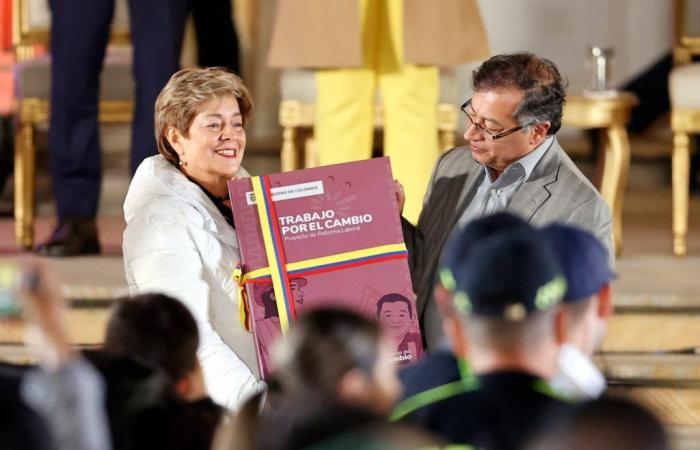The labor reform of the Government of Gustavo Petro finally advances in the Congress of the Republic. The Seventh Commission of the House of Representatives approved on Tuesday morning the bill that seeks to improve working conditions for millions of workers in Colombia, and that for more than a year had not managed to pass any debate. The reform obtained 14 votes for yes and 4 for no, an absolute majority that was achieved after months of consultation between the Government and independent groups. The project, which still has three debates in Congress to become law, received the support of the parliamentarians of the Historical Pact, the Green Alliance, the Comunes party, the peace seats, the Liberal Party and some votes from the Party of the U and the conservatives. Cambio Radical and the Democratic Center opposed the entire reform.
Among the main articles approved is the increase of two hours in the night shift, which with the reform will begin at seven at night instead of the current nine at night; 100% payment for work on the mandatory day of rest, which today is 75%; and the payment of 100% of the minimum wage to SENA apprentices. The reform also establishes the indefinite-term contract as a rule in labor contracting, above the provision of services and outsourcing; increases paternity leave from two to six weeks and guarantees a contract and an agricultural wage, a benefit for more than a million farmers who today are informal. The Minister of Labor, Gloria Inés Ramírez, thanked the congressmen for their work, and highlighted that the bill advances with three fundamental objectives: “Labor rights, sustainable companies and dignified and decent work.”
Representative María Fernanda Carrascal, of the Historical Pact and coordinator of the project speakers, celebrated the victory: “We are moving forward! We approved the labor reform in the first debate. This is wonderful news for the country’s 23 million workers. We recovered the rights that Uribismo had taken away from them 22 years ago and we conquered some new ones that, I am sure, will give them greater stability and economic well-being,” she wrote in her X account.
With this decision of the House of Representatives, President Petro wins another unexpected victory in the final stretch of the legislative period, which adds to the success of his pension reform. However, the victory for the Government is bittersweet because the project advances the individual rights of formal workers, but leaves out many articles related to union and strike guarantees. In the end, 82 articles were approved and 22 were eliminated. The rejected articles, a requirement of independent congressmen to approve the rest of the project, prohibited collective agreements between non-unionized workers and companies (a way to encourage union membership). , removed the 68-day time limit that strikes have today, forced equal representation of men and women in organizations, and allowed strikes in essential services as long as “minimum services” were maintained.
Many workers and unionized sectors close to Petro regretted the reduction of the reform. Fabio Arias, president of the Unitary Central of Workers (CUT), criticized the collapse of this block of articles. “Denying union freedoms is denying democracy.” The senator of the Historical Pact, Clara López, also referred to the elimination of association rights: “Collective rights are sacrificed to at least save the recovery of individual labor rights. “We need to strengthen popular power in the face of economic power to overcome the anti-union bias of the country’s unions and big businessmen in votes.”
Despite criticism, the approval of this reform in the first debate demonstrates once again that the Government is capable of achieving consensus with independent sectors if it is willing to give in. Less than two weeks ago, this bill seemed definitively sunk. However, the Minister of the Interior, Luis Fernando Velasco, and the Minister of Labor, Gloria Inés Ramírez, together with the congressmen of the ruling party, managed to agree with sectors other than Petro on the progress of the reform: “Dialogue and concertation for the labor rights of the Colombian population. Its debate continues in the next legislature in the plenary session of the Chamber. Thanks to the congressmen who promote and defend rights for the country,” Minister Ramírez wrote on her X account.
Newsletter
The analysis of current events and the best stories from Colombia, every week in your mailbox
RECEIVE THE
The reform also managed to advance the regulation of working conditions of digital platforms such as Rappi or Uber. Three specific articles were approved in the project that determine the new rules for this sector: “This progress has required between 8 and 9 months of consultation. It is a recognition of what digital work means and advances the conceptualization of digital companies and digital workers,” said Ramírez. According to the minister, the approved articles allow companies to have a special digital contract or link the worker independently. In this last modality, companies will assume the occupational risk system and will pay 60% of social security and the worker will assume 40%.
Now, the bill must be discussed in the next legislature that begins on July 20, first in the plenary session of the House of Representatives and then in the Seventh Committee of the Senate and in the plenary session of the Senate. In the next discussions, the Government will try to recover some of the union association rights that were left out, while the opposition, much stronger in the Senate, will seek to improve the conditions of the business community.
Subscribe here to the EL PAÍS newsletter about Colombia and here to the channel on WhatsAppand receive all the information keys on current events in the country.






